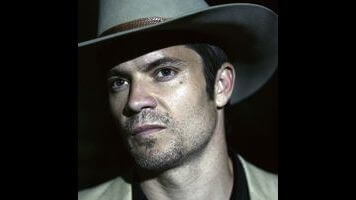Justified: “When The Guns Come Out”

There’s a fine line between colorful and cartoonish, and Elmore Leonard’s best work tends to exist just on the right side of it, to where his character’s quirks do not entirely become them. If there’s one ongoing concern I have with this otherwise excellent current season of Justified, it’s that the villains, specifically Quarles and Limehouse, are perilously close to stepping over the line. In the context of, say, a season of Buffy The Vampire Slayer or a Batman movie, their outsized Big Bad qualities would be a more comfortable fit than in Justified, which can (and should) accommodate larger-than-life Leonard characters, but calls for some grounding in the world of Harlan.
Limehouse’s final scene in “When The Guns Come Out” goes a long way toward easing any misgivings about him as a regional cartoon of a snarling BBQ pitmaster. In castigating his lieutenant for inciting a blood feud between Quarles and Boyd over Harlan’s Oxy business—a Yojimbo-like move that seems more clever than Limehouse reveals it to be—we get not only the Biblical fury we’ve seen from Limehouse before, but a nuanced understanding of how such a plan could ignite the simmering hostility people in the area have for African-Americans. It’s hard to think of a character as imposing as Limehouse being fearful of anything, but his keen awareness of this regional powder keg—and that of his neighbors, who are sensitive to the goings-on in white Harlan—makes him more human. Clearly, Limehouse wants his piece of the action, but he’s not free to stake his claim as provocatively as his white adversaries.
Quarles, on the other hand, still seems a little one-dimensional, though that one dimension—pure, sadistic evil—can be awfully entertaining. So far, his distinguishing characteristic, beyond Neal McDonough’s cold blue eyes, is his venality. He seems to be in the business of misery, serving no other end than twirling his own metaphorical mustache; doing bad gives him pleasure and that alone appears to be enough. The effect so far is that it makes the characters around Quarles more compelling than Quarles himself: Perhaps my single favorite moment in tonight’s episode was Wynn Duffy’s reaction when Quarles says, “‘Boss.’ I like that. You’re a good man, Wynn.” This is Wynn Duffy, a lowlife’s lowlife, now having entered a moral universe so depraved that he looks like a good man. Scary.
As with last week, “When The Guns Come Out” moves like a shot, powered by a strong episodic plot that ripples through all corners of Harlan. After last week’s tense powwow between Quarles and Boyd, it seemed obvious that the bloody raid on Boyd’s Oxy operation—leaving three dead bodies and an emptied pill closet—would be Quarles’ responsibility, the opening salvo in the battle for control over the territory. And though it’s revealed later to be a sabotage attempt by one of Limehouse’s associates, it makes sense for Quarles to make a move like that now, when his forces are still much stronger than Boyd’s still-nascent operation. But it’s fascinating to see Boyd puzzle his way through the situation rather than jump to that conclusion immediately, as others might. Boyd is a tactical genius and he respects Quarles’ game enough to know that such an attack might not be tactically sensible. So he investigates.
At the same time, we get more of Raylan than we have in a while. With Winona having skipped town, Raylan is facing the usual problem of being divided between her and work—and work, despite his best efforts, always winning out. It’s never a question to Art that Raylan has to be the one to look into the Oxy clinic shooting; his trouble with Winona has to be second priority. But more fundamentally, it’s plainer than ever that Raylan can’t leave Harlan even if he wanted to, because his father keeps dragging him back into the muck. With Boyd setting up shop in his Aunt Helen’s house, Raylan is the picture of world-weariness: He simply cannot address Harlan’s criminal business without it mingling with his personal business. Winona has every right to leave under those circumstances—this isn’t merely a case of the workaholic partner and future father, but someone who brings danger into their lives with regularity. And as long as Arlo and Boyd are hanging around, it’s not going to stop.
Stray observations:
- Line of the night, for my money: “You know you’re in trouble when the drums stop.” Real wisdom from Art on the Winona situation. For Winona to come to a resolution about Raylan, rather than keeping scrapping with him, is a terminal shift.
- Fine work from William Mapother (best known as Tom Cruise’s first cousin, though he should be known for being excellent in everything) as Delroy the pimp, whose prostitute-beating swagger is significantly curbed by two swift Raylan cracks to the nose.
- Nice to see Ava becoming such an active and important part of the show, especially in an episode where women are victimized so savagely. She’s a sly tactician, too, and seems more aligned and simpatico with Boyd than I ever suspected in the past.
- Boyd: “Next round’s on me.” Raylan: “You gonna pay for that with the money you made selling Oxy at my aunt’s house?”
- The reemergence of the evidence locker money brings back a subplot that I’d hoped was buried forever. We’ll see what comes of it.